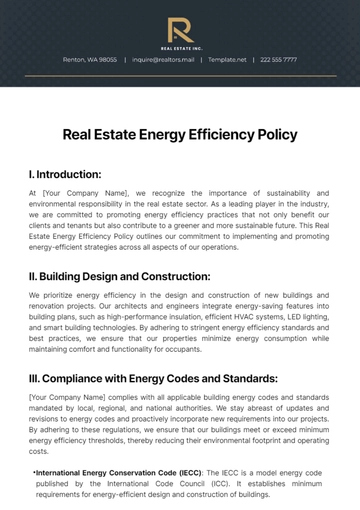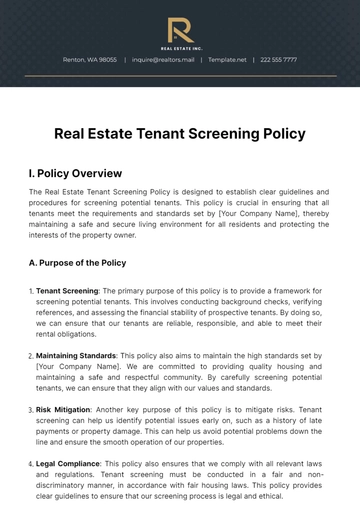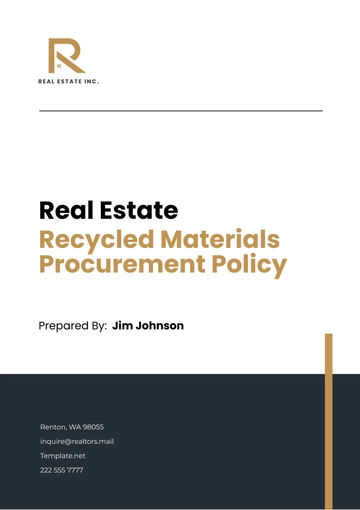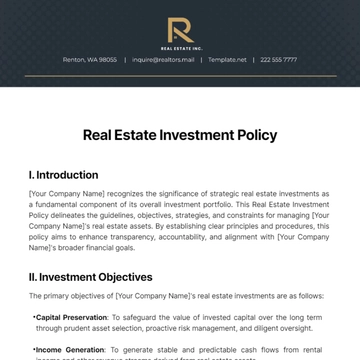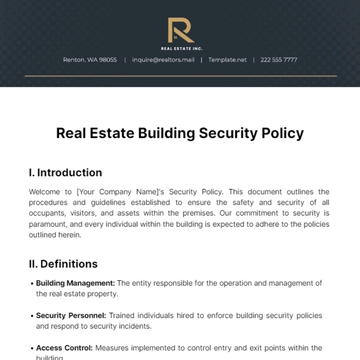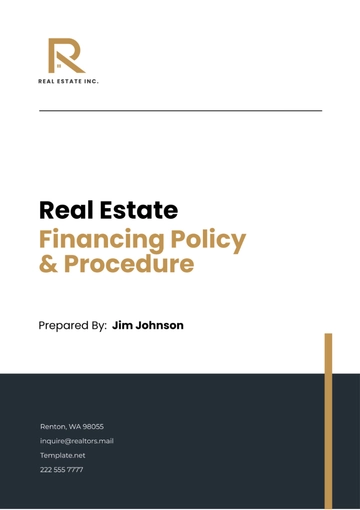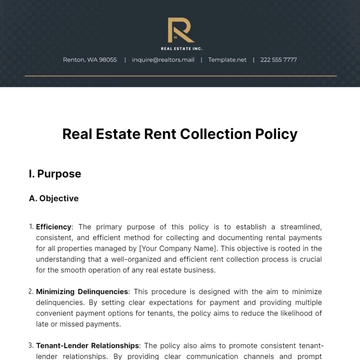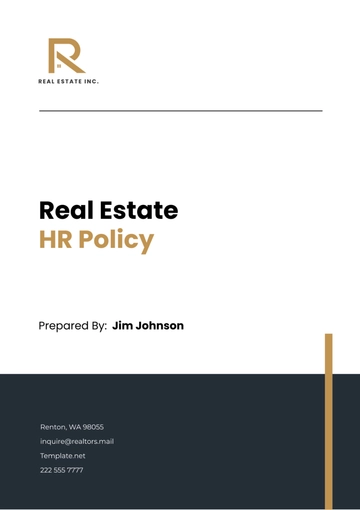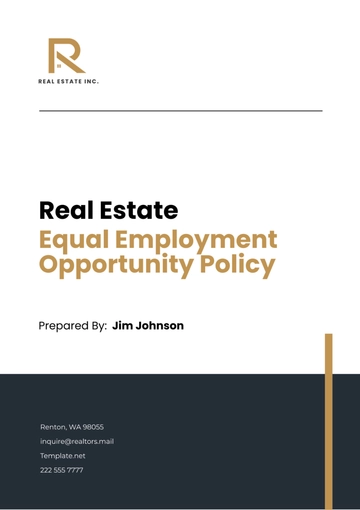Free Real Estate Investment Policy
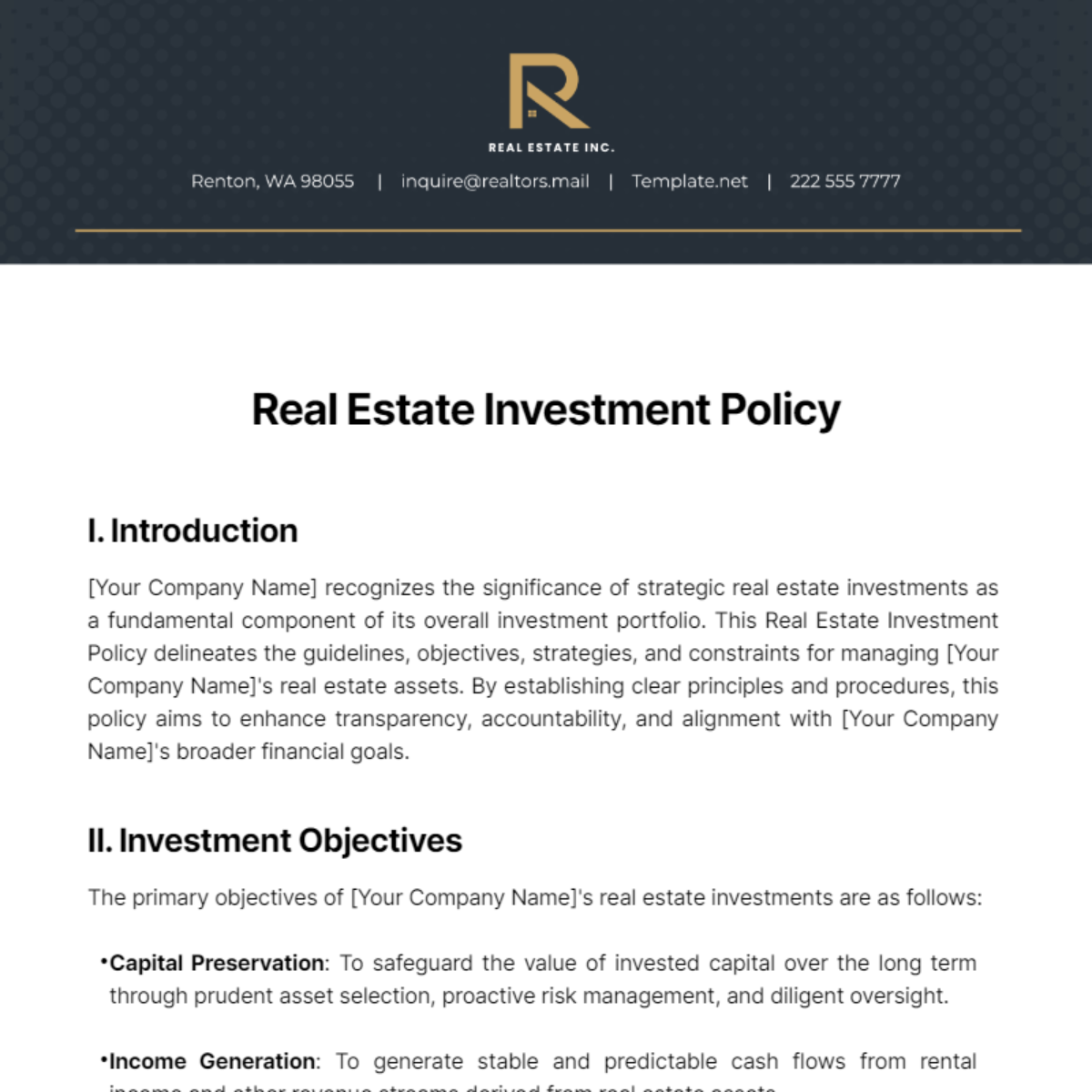
I. Introduction
[Your Company Name] recognizes the significance of strategic real estate investments as a fundamental component of its overall investment portfolio. This Real Estate Investment Policy delineates the guidelines, objectives, strategies, and constraints for managing [Your Company Name]'s real estate assets. By establishing clear principles and procedures, this policy aims to enhance transparency, accountability, and alignment with [Your Company Name]'s broader financial goals.
II. Investment Objectives
The primary objectives of [Your Company Name]'s real estate investments are as follows:
Capital Preservation: To safeguard the value of invested capital over the long term through prudent asset selection, proactive risk management, and diligent oversight.
Income Generation: To generate stable and predictable cash flows from rental income and other revenue streams derived from real estate assets.
Capital Appreciation: To achieve attractive risk-adjusted returns through the appreciation of property values over time, driven by favorable market conditions and strategic asset management initiatives.
Portfolio Diversification: To enhance overall portfolio diversification by allocating capital across different property types, geographic regions, and investment strategies to mitigate concentration risk.
III. Risk Tolerance
[Your Company Name] acknowledges that real estate investments entail various risks, including but not limited to market risk, liquidity risk, credit risk, and operational risk. [Your Company Name]'s risk tolerance is guided by the following principles:
Prudent Risk Management: Employing rigorous due diligence processes, stress testing scenarios, and risk mitigation strategies to identify, assess, and manage risks effectively.
Conservative Leverage: Maintaining a conservative approach to leverage, with prudent debt levels and stringent underwriting standards to minimize financial leverage risk and ensure adequate liquidity.
Market Sensitivity: Monitoring market dynamics, economic indicators, and geopolitical developments to adapt investment strategies accordingly and mitigate exposure to external risks.
Compliance and Governance: Adhering to regulatory requirements, ethical standards, and industry best practices to uphold the highest standards of integrity, transparency, and accountability in all real estate investment activities.
IV. Asset Allocation
[Your Company Name]'s real estate investment strategy encompasses a diversified portfolio of properties across different sectors, including but not limited to:
Commercial Real Estate: Including office buildings, retail centers, industrial warehouses, and mixed-use developments located in prime urban and suburban markets with strong demand fundamentals and attractive growth prospects.
Residential Real Estate: Including multifamily apartment complexes, condominiums, and single-family rental homes in high-demand rental markets with favorable demographic trends and robust rental income potential.
Hospitality and Leisure: Including hotels, resorts, and vacation rental properties in strategic tourist destinations with resilient demand dynamics and attractive hospitality market fundamentals.
Specialized Real Estate: Including healthcare facilities, data centers, self-storage facilities, and other specialized property types with unique value propositions and niche market opportunities.
The allocation of capital to each property type will be guided by market research, investment analysis, and strategic asset allocation considerations to optimize risk-adjusted returns and portfolio diversification.
V. Performance Benchmarks
[Your Company Name] will evaluate the performance of its real estate portfolio against relevant benchmarks, including but not limited to:
NCREIF Property Index: A widely recognized benchmark for institutional real estate investors, providing comprehensive performance data for private market commercial properties in the United States.
FTSE EPRA/NAREIT Global Real Estate Index: A global benchmark index tracking publicly traded real estate investment trusts (REITs) and real estate operating companies (REOCs) across developed and emerging markets worldwide.
Customized Performance Metrics: Tailored performance metrics may be developed to assess [Your Company Name]'s real estate portfolio performance relative to specific investment objectives, peer group benchmarks, and internal targets.
Regular performance reviews will be conducted to assess the portfolio's progress, identify areas for improvement, and make informed investment decisions to optimize risk-adjusted returns.
VI. Investment Guidelines
[Your Company Name]'s real estate investment activities will adhere to the following guidelines:
Due Diligence: Conducting thorough due diligence on prospective real estate investments, including financial analysis, market research, property inspections, legal reviews, and environmental assessments, to assess investment viability and mitigate risks.
Asset Selection: Selecting properties with strong cash flow potential, attractive risk-adjusted returns, and value enhancement opportunities through proactive asset management strategies, such as leasing optimization, capital improvements, and redevelopment initiatives.
Financing Structure: Implementing prudent financing structures with appropriate debt levels, favorable terms, and fixed-rate financing to mitigate interest rate risk and ensure adequate liquidity for operational needs.
Environmental, Social, and Governance (ESG) Considerations: Integrating environmental sustainability, social responsibility, and corporate governance principles into real estate investment decision-making to enhance long-term value creation, mitigate risks, and align with stakeholder expectations.
Exit Strategy: Developing clear exit strategies for each real estate investment, including options for disposition, refinancing, or portfolio rebalancing to optimize returns and respond to changing market conditions.
VII. Liquidity Management
[Your Company Name] will maintain sufficient liquidity within its real estate portfolio to meet operational needs, fund distributions, and capital calls, while balancing the objectives of capital preservation and return optimization. Liquidity management strategies may include:
Cash Reserves: Maintaining adequate cash reserves or short-term liquid investments to cover near-term expenses, debt service obligations, and unforeseen contingencies.
Line of Credit Facilities: Establishing revolving lines of credit or other credit facilities to provide additional liquidity and financial flexibility for opportunistic investments or capital deployment opportunities.
Portfolio Diversification: Diversifying investments across different property types, geographic regions, and investment strategies to enhance liquidity and mitigate concentration risk.
VIII. Governance and Compliance
[Your Company Name]'s real estate investment activities will be governed by robust governance and compliance frameworks, including:
Oversight and Accountability: Establishing clear roles, responsibilities, and decision-making processes for [Your Company Name]'s management team, investment committee, and external advisors to ensure effective oversight and accountability.
Regulatory Compliance: Adhering to applicable regulatory requirements, licensing obligations, tax regulations, and reporting standards related to real estate investments in all relevant jurisdictions.
Ethical Standards: Upholding the highest standards of integrity, transparency, and ethical conduct in all real estate investment activities, including avoiding conflicts of interest, insider trading, and other unethical practices.
Reporting and Disclosure: Providing timely and transparent reporting to stakeholders, including investors, regulators, and other relevant parties, regarding [Your Company Name]'s real estate investment performance, portfolio composition, and risk management practices.
IX. Monitoring and Reporting
[Your Company Name] will establish procedures for monitoring the performance of its real estate portfolio, conducting regular reviews, and providing transparent reporting to stakeholders. Key monitoring and reporting activities may include:
Performance Analysis: Analyzing key performance metrics, including total return, income yield, capital appreciation, and risk-adjusted returns, to assess the effectiveness of the real estate investment strategy and identify areas for improvement.
Risk Management: Monitoring market trends, economic indicators, and risk factors affecting real estate markets to proactively identify and mitigate potential risks to the portfolio's performance and stability.
Compliance Monitoring: Conducting periodic compliance reviews to ensure adherence to regulatory requirements, internal policies, and industry best practices in real estate investment activities.
Stakeholder Communication: Engaging with investors, regulatory authorities, and other stakeholders through regular updates, investor communications, and performance reports to maintain transparency and foster trust and confidence in [Your Company Name]'s real estate investment program.
X. Conclusion
This Real Estate Investment Policy establishes the framework for managing [Your Company Name]'s real estate investment activities in a disciplined, transparent, and risk-aware manner. By adhering to the principles outlined in this policy, [Your Company Name] aims to optimize risk-adjusted returns, enhance portfolio diversification, and align real estate investments with its broader financial objectives and stakeholder interests.
[Your Company Name] remains committed to pursuing real estate investments that deliver sustainable financial performance, support long-term value creation, and contribute positively to the achievement of its broader mission and objectives. Through disciplined execution, prudent risk management, and strategic decision-making, [Your Company Name] aims to position its real estate portfolio for success in an ever-changing and dynamic investment landscape.
- 100% Customizable, free editor
- Access 1 Million+ Templates, photo’s & graphics
- Download or share as a template
- Click and replace photos, graphics, text, backgrounds
- Resize, crop, AI write & more
- Access advanced editor
Define clear investment strategies with our easily editable Real Estate Investment Policy Template from Template.net. Accessible via our AI Editor Tool, this customizable template offers comprehensive guidance on objectives, risk tolerance, and asset allocation. Streamline decision-making, mitigate risks, and maximize returns effortlessly with this template, readily available for customization at Template.net!
You may also like
- HR Policy
- Restaurant Policy
- Company Policy
- Accounting Policies and Procedures
- Website Policy
- Privacy Policy
- Safety Policy
- School Policy
- IT and Software Policy
- Law Firm Policy
- Construction Policy
- Interior Design Policy
- Travel Agency Policy
- Education Academic Policy
- Security Policy
- Real Estate Policy
- Expense Policy
- Software Policy

